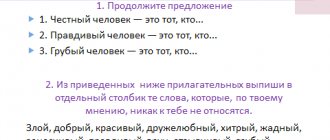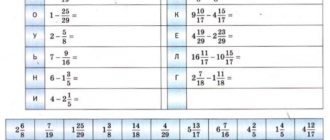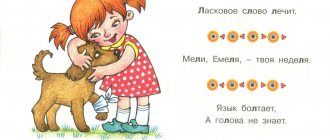Russian language lesson notes, grade 6 “Morphemics, word formation, spelling”
Russian language lesson in 6th grade
Topic: “Morphemics, word formation, spelling.” Goal: consolidate and generalize the knowledge acquired on the topic; develop monologue speech skills and independent work; attention, memory, thinking; communication skills; to develop skills of self-control, reflection, to cultivate interest in the Russian language. Planned results: - subject: apply knowledge and skills in morphemics in spelling practice, as well as when conducting morphemic and word-formation analysis of words; - cognitive UUD: formulate cognitive goals, analyze objects, carry out classification according to various criteria, analyze information, generalize in the form of a rule; use acquired skills when performing creative tasks, explain linguistic phenomena, processes, connections and relationships identified in the course of performing work; - personal UUD: establish the significance of cognitive activity, evaluate the assimilation of the content of the material, - communicative UUD cooperate in searching and collecting information, evaluate the actions of a partner, learn to take into account the position of the interlocutor; comment on their own actions when completing a task; — regulatory educational activities set educational objectives and carry out control. Goal: learn to determine the role of morphemes in word formation. Objectives: Educational: repeat the material studied in grade 5: summarize, systematize knowledge on the topic “Morphemics”; determine the role of morphemes in word formation Developmental: develop memory, thinking, spelling vigilance, develop grammatical skills; Educational: to instill interest in the Russian language. Lesson progress I Organizational moment. Greetings, communication of the topic of the lesson, goals, registration of class work in notebooks. (Everything in the world consists of something: a forest is made of trees, clouds are made of many water drops, the human body is made of cells. And words are made of their own building material. In this lesson you will remember what you know about the composition of a word. ) II updating of knowledge (Front survey) What is Morphemics? (that is the branch of the science of language in which morphemes are studied - parts of a word: prefix, root, suffix, ending.) What is a morpheme? (A morpheme is the smallest significant part of a word.) What morphemes do you know? (prefix, root, suffix, ending, ) The form of the same word is (the lexical meaning remains the same. Only its grammatical meaning changes.) Cognate words are words with different lexical meanings) III Work on the topic The main part of the word , its semantic center, is the root. New words appear from it, like buds on a flower. - Let's, using the root from the word water, form new words that will be verbs (dehydrate, flood, water, etc.) - And now, let's try to form nouns (vodichka, voditsa) - Adjectives (aqueous, underwater, anhydrous, etc.) ...) Do you know what the maximum number of roots can be in a word? (three - mud bath, aircraft construction) - Another important morpheme in the word is the ending. Let's conduct a linguistic experiment and determine what function it performs. Let's read the sentence It's early morning, and the children go to school, omitting the endings in the words. It now sounds like this: It’s early in the morning, and the children go to school. As we can see, the ending serves to connect words in a sentence and phrase. — Read the poem and draw a conclusion about why suffixes are needed in the Russian language. At the same time, pay attention to the following words: Glory, fence, bench, Borya, notebook, pencil, forehead, neck. Slavochka is sitting on the fence, and Borenka is sitting on the bench below him. Borenka took a notebook and wrote: “You are a fool, Slavochka.” Slavochka took out his pencil and wrote in his notebook: “You are a fool.” Borishche took the notebook and how it will crack Slavishch’s forehead. Slavishche took the bench. Yes, how Borishche will crack in the neck. Slavochka is crying under the fence, Borenka is crying under the bench. As you may have noticed, the suffixes of nouns in this poem are similar to the magic mushroom from the famous fairy tale about Alice, which helped the girl to grow and then shrink again. They serve to form new words. The suffix - ISH - enlarges objects, helps make a thin notebook into a thick NOTEBOOK, and the suffix - IR -, on the contrary, reduces everything and makes a high FENCE a low FENCE. — Like a suffix, a prefix is used to form new words. Using a prefix, we can change the form of the verb and make an unfinished action complete, for example: write - write, run - run. There are words in the Russian language that are worthy of being included in the Guinness Book of Records, since they contain three prefixes in a row, which happens extremely rarely. These are the words: from - to - for the wound, per - race - limit - divide. Exercise 1: Highlight the suffixes and form new words similar to the given ones. Slanderer, guide, shoemaker, drummer, gardener; whiteness, coolness, stupidity, novelty, yellowness; honesty, accuracy, courage, calmness; daring, well done, merchant, seller, handsome, favorite Exercise Form words with these morphemes. Make sentences with them. Work in groups (in pairs). Perform a word-formation analysis of the words - cheerful, - ravine, - candlestick, - running, - timber carrier, - ice cream. Exchange notebooks and check each other's assignments. Exercise 3. Form root words by discarding suffixes and prefixes. For example: windless - wind, spinning - circle. To lie - , complete - , error - , to suffer - , to chill - , branch - , transformation - , unconstrained - , inalienable - - , impeccable - . VI. Test. Find the extra word: A) mountain, B) mountainous, C) burn, D) hillock. Find the word that matches the pattern: A) house, B) water, C) fearless, D) read. Choose the correct answer: – eat is the ending of A) noun. and. R. , B) Ch. n. f. , B) Ch. 2 l. units part I reference Find a word with the letter s A) super__deyny, B) sport__gra, C) raz__kat, D) disinfection Find a word with the prefix pre - A) fly, B) knit, C) lie down, D) dear. VII. Homework. Come up with a text with 15 words with the studied spellings. VIII. Lesson summary. What sections did we review today? What does “morphemics” study? What functions do morphemes perform?
We recommend watching:
Summary of a Russian language lesson in the 6th grade of a special (correctional) school of the VIII type. Summary of a Russian language lesson in the 6th grade of a correctional school of the VIII type on the topic “Case endings and Didactic game in the 6th grade in the Russian language. Summary of a lesson-game in the Russian language in the 6th grade. Spelling pronouns
Similar articles:
Lesson summary in Russian language 6th grade
Final test with answers in the Russian language for grades 5-6-7
Methodological development of a lesson in the Russian language. Creative essay: Sea voyage to the future
Lesson summary of educational selective presentation in 6th grade
Summary of a Russian language lesson in 6th grade on the topic: Neologisms
Presentation for a Russian language lesson in 6th grade “Morphemics. Word formation"
Slide 1
Russian language lesson in 6th grade, developed based on the technology of critical thinking through reading and writing. Topic: “Morphemics. Word formation." Program edited by M.T. Baranova, T.A. Ladyzhenskaya, N.M. Shansky. Teacher of Russian language and literature of the Municipal Educational Institution “Russian School” Popenko Natalya Konstantinovna.
Slide 2
Technological stages of the lesson: challenge - involvement in a problem or process, cluster, brainstorming. understanding the content insert, visualization, table compilation, syncwine reflection
Slide 3
Lesson objectives: remember and formulate definitions of morphemes; learn to determine the meaning of parts of words; improve skills in selecting words with the same root; make a table.
Slide 4
Organization Teacher - students.
Slide 5
Ninth of October Morphemics prefix root suffix ending stem
Slide 6
The scientist and linguist A.N. Tikhonov wrote: “Each part of a word expresses something, carries some meaning, serves something.”
Slide 7
Lesson topic: “Parts of a word.”
Slide 8
Lesson outcome goals: remember and formulate definitions of morphemes; learn to determine the meaning of parts of words; improve skills in selecting words with the same root; make a table
Slide 9
Fill in the missing words or phrases that will help you remember the definitions of word parts (morphemes). An ending is a significant part of a word that forms the form of a word and serves to connect words in a phrase. Among the endings there are zero endings. A stem is a part of a variable word without___________ ending or the entire unchangeable word. The root is the main significant part of the word, which contains the general lexical meaning of all _______________________ words of the same root. A suffix is a significant part of a word that is located after the _______ root or after another suffix and serves to form new words.
Slide 10
A prefix is a significant part of a word that is located before a _________ root or another prefix and is used to form new words.
Slide 11
Put icons in the margins: “V” - already knew, “+” - new, “?” – I don’t understand, I have questions. No. Definition Icon 1 The ending is a significant part of the word that forms the form of the word and serves as a connection in phrases and sentences. Among the endings there are zero endings. 2 The stem is a part of a modified word without an ending or the entire unchangeable word. 3 The root is the main significant part of the word, which contains the general lexical meaning of all words with the same root. 4 A suffix is a significant part of a word that is found after a root or after another suffix and is used to form words. 5 A prefix is a significant part of a word that is located before a root or another prefix and is used to form words.
Slide 12
Linguistic tale on the theme: “Root. Cognate words." The title of the fairy tale is “Wonderful Transformations.”
Slide 13
— Earth — DEL(e)+ Agriculture yak Countryman WHEN Landed Not Unearthly
Slide 14
Questions about the text: 1. What root are we talking about? 2. What miracles happened to the root -EARTH- when he put on various clothes - morphemes? 3. In what meaning is the word TRANSFORMATION used? 4.What outfits does the root -EARTH- wear, list them.
Slide 15
Each morpheme has its own meaning and purpose. ZEML +(e)+DEL AGRICULTURE ZEML + YAK ZEMLYAK PRI + ZEMLYAK LANDED NOT + ZEML UNEARTHLY Do you think these words have the same root?
Slide 16
Let us turn to the meaning of the word “Earth.” Earth is a planet inhabited by people, “soil, the upper layer of the earth’s crust.”
Slide 17
1. Terrestrial - relating to our earth, to the world, to the globe. (Earthly life, earthly business); 2. Unearthly - the prefix is not used in the sense of negation. (Unearthly beauty, unearthly life). Earthy – related to the earth. (Earthworm, earth coal)
Slide 18
Select cognate words Worksheet - Kras - - Glot- -Circle- Cognate words Paint, paint, dyeing, dye, decorate. Swallow, gulp, absorb, swallow, swallow. Spin, spin.
Slide 19
Sinkwine Root Main and significant Contains, unites, captivates Root - the lexical meaning of the word Morpheme
Slide 20
Homework Compose a linguistic fairy tale based on the sentence from Exercise 162, p. 90 - “5”; Come up with words with the same root for the words “friend”, “offense”. Ex. 161, p. 90.- “4”; Ex. 158, p. 89.- “3”
Slide 21
Thank you for your attention!
Presentation “Morphemics and word formation.” presentation for a Russian language lesson (grade 6)
Slide 1
Morphemics and word formation 6th grade
Slide 2
Which row contains only word forms? Telephone, telephone, telephone Spring, spring, spring Horse, horses, cavalry Swim, swim, swim
Slide 3
Which row contains only word forms? Telephone, telephone, telephone Spring (I.p.), spring him (D.p.), spring him (R.p.) Horse, horses, cavalry Swim, swim, swim
Slide 4
Task: distribute the words according to the methods of their word formation Words formed: By the prefix method By the suffix method By the prefix-suffix method By the non-suffix method Adding stems Adding words By moving from one part of speech to another Teacher's, boarding school, locomotive, coaster, departure, forest park, avoid, reddish, Volgograd, launch vehicle, ice cream, remake, tip, dispute
Slide 5
Task: distribute the words according to the methods of their word formation Words formed: In a prefix way: redo, avoid In a suffix way: locomotive, reddish In a prefix-suffix way: under a glass, on the tip In a suffixless way: departure (from departure t), dispute (from dispute and t) Addition of basics: forest about park, Volga about grad Addition of words: school - boarding school, rocket - launch vehicle By moving from one part of speech to another: teacher's room (from adj. teacher's room), ice cream ( from adj. frozen meat)
Slide 6
Build word-formation chains 1. Teacher 2. Salting
Slide 7
Build word-formation chains 1. Teacher nitsa teacher teach 2. Salting for salting salting salt
Slide 8
Independent work Task 1: distribute words according to the methods of their formation, highlight word-forming morphemes Option 1 Option 2 Prefix 1. Suffix Non-suffix 2. Prefix-suffix Addition of stems 3. Addition of words Sponsored, nut, major general, make, all-terrain, find, translator , entrance, rocking chair, collar, plane, under the ice, easy, repeat, Novokuznetsk Task 2: Build a word-formation chain for the word 1st option: watery 2nd option: striped
Slide 9
Answers Option 1 Option 2 Task 1 Task 1 Prefix: once to find, from prepare, not difficult Without suffix: entry (from entry and t) repetition (from repeat and t) Adding the basics: airplane, Nov about Kuznetsk Suffixed: nut ek, all-terrain, translator Prefix-suffixal: under the boss, collar, under the ice Compounding words: rocking chair, major general Task 2 Task 2 Watery watery water Striped stripes stripes a



